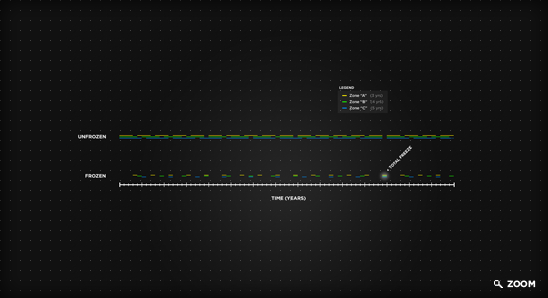Post
Frozen Worlds: a Time Puzzle
I got a bit giddy when we got to the “Space and Time” portion of my Metaphysics class. Most of my semester was spent deciphering bizarre accounts of matter (where two theories’ definitions could differ by just a single word), and I was more than ready for a change. I like the topic of Time in particular because I really have no idea what it is, and metaphysical analysis seems a bit more accessible than a purely physical approach.
Time is typically associated with change, and a famous puzzle related to this concept is Shoemaker’s “freeze world” scenario. Shoemaker’s scenario, first proposed in “Time Without Change”, describes a discrete possible world consisting of three zones: A, B and C. Under normal conditions, the inhabitants of each zone are able to observe and communicate with each other. However, a mysterious phenomenon occurs occasionally whereby all change in a zone ceases, meaning no motion, growth or decay occurs. During these “local freezes”, inhabitants of the other unfrozen zones can observe that all activity has, indeed, stopped (while their zones remain active). Individuals in the frozen zone do not immediately detect the freeze, as their activities will simply resume as if no freeze had occurred. Frozen observers focused on one of the other zones would notice large, instantaneous changes as they become acquainted with the post-freeze world. In Shoemaker’s example, these local freezes are found to occur cyclically (every three years in Zone A, every four in Zone B, and every five in Zone C) and last for one year each time. The cycles are in phase, so every sixty years, the frozen periods of each zone align to create a “total freeze” where absolutely no change occurs in the entire world. The term of this total freeze would be undetectable to the world’s inhabitants who had previously referenced other zones’ clocks or their own perception of other zones’ change to recognize the freeze. This scenario establishes the idea that one in sixty years will be what Shoemaker calls a “changeless interval”.
The importance of these total freezes is that they dissociate the passage of time from the occurrence of events in the world (that our normal conception of time requires). However, there are a few inconsistencies in Shoemaker’s scenario that prevent it from convincingly proving its conclusion. For anyone interested, I discuss some of the more theoretical problems in this paper I submitted in the course. I’ll explain some quick ones here.
The first is a physical problem with the scenario. As far as we can understand, motion and change are critical to the very persistence of matter. The constant movement and vibration of atoms and subatomic particles are required to maintain the tenuous structural and electrical integrity of these entities. Take the phenomenon of absolute zero, for example, the temperature (0K, -273°C) at which molecular motion mostly ceases. Reaching absolute zero is theoretically impossible, an asymptotic limit not unlike the speed of light. Even approaching absolute zero causes wild variations in a substance’s properties including quantum effects like superconductivity. The impossibility of reaching absolute zero therefore raises serious doubts on the feasibility of Shoemaker’s scenario.
Another critique of Shoemaker is theoretical in nature and involves the ideas of time and change in the “freeze world” scenario. The terms are not well defined, and the lack of clarity ultimately leaves Shoemaker begging the question. What exactly does it mean for time to pass in frozen zones, what do these “changeless intervals” refer to? In the scenario, time can be observed to pass when one or two zones are frozen because of the remaining reference zone(s). When the frozen zones thaw, they can consult clocks or observers in the unfrozen zone to learn that their zone had indeed been in a freeze. However, in a total freeze, no such reference exists, and to say that the zones continue frozen for one year is to gratuitously assume the conclusion that changeless time is possible. During the single local freezes, the passage of time is still relative to changes occurring in the unfrozen zone(s). To inhabitants of the frozen zone, the one year freeze passes instantaneously and would have gone unnoticed were it not for observers in the unfrozen zones. However, during the total freeze, all changes in the world cease, and without the reference of changes in unfrozen zones, the intervening period does pass instantaneously and inhabitants of the world would never know. Shoemaker’s scenario is therefore reducible to the total freeze (there is still time and change during single local freezes), and the conclusion that there is a one-year changeless interval is not adequately supported.
These problems mostly disprove the scenario for me. What do you think, is changeless time possible?
Archive
-
260.
The Ethics of Practicing Procedures on the Nearly Dead
The report from the field was not promising by any stretch, extensive trauma, and perhaps most importantly unknown “downtime” (referencing the period where the patient received no basic care like...
-
260.
The Ethics of Teaching Hospitals
I can’t imagine what the patient was thinking. Seeing my trembling hands approaching the lacerations on his face with a sharp needle. I tried to reassure him that I knew what I was doing, but the...
-
260.
Conscious Conversation: Behavioral Science
Dr. Eran Zaidel is a professor of Behavioral Neuroscience and faculty member at the Brain Research Institute at UCLA. His work focuses on hemispheric specialization and interhemispheric interaction...
-
260.
Progress Report
Two years down, I’m still going. The next two years are my clinical rotations, the actual hands-on training. It’s a scary prospect, responsibilities and such; but it’s equally exciting, after...
-
260.
Why Medical School Should Be Free
There’s a lot of really great doctors out there, but unfortunately, there’s also some bad ones. That’s a problem we don’t need to have, and I think it’s caused by some problems with the...
-
260.
The Cerebellum: a model for learning in the brain
I know, it’s been a while. Busy is no excuse though, as it is becoming clear that writing for erraticwisdom was an important part of exercising certain parts of my brain that I have neglected...
-
260.
Conscious Conversation: Philosophy
Daniel Black, author of Erectlocution, was kind enough to chat with me one day and we had a great discussion – have a listen.
-
260.
The Stuff in Between
I’m actually almost normal when not agonizing over robot production details, and quite a bit has happened since I last wrote an update. First, I’ve finally graduated. I had a bit of a...




Comments
I doubt that this scenario is possible, mostly for the reasons you stated. Also, if it was possible to completely “freeze” a region, I doubt that the region would actually be observable. Observation depends on light, and if we allow photons to move through the region, then it is not totally frozen. Even allowing this small breaking of the rules, these photons would still be interacting with the frozen matter, causing some amount of change.
The frozen area would have to be totally devoid of photon interactions, thus totally obfuscated, which would largely destroy the point of this exercise. As an amusing aside, I’m guessing the surface of said region would have to be either mirrored, or completely invisible.
Though, more to the point, and ignoring the photon/outside observer problem, I’m sure changeless space is possible, though it would have to be a perfect vacuum.
Omestes
Dec 24, 10:38 AM #
The terms “change” and “time” are indicating ‘Plato’s Divided Line’ where change is what is subject to the senses and to relative experience below the Divided Line whereas the concept of “time” is not.
We are experiencing change all the time, it is a continuous phenomenon of our world. It is so much present with us that we actually don’t even notice it often times. The rotations of the earth for example. We maybe looking at cloude formations in the sky without specifically seeing them as “change”.
Any understanding of change has to come from a reference of stillness as Aristotle already observed. This means change can never be observed or ascertained without some relative point of no-change.
Time seems to be another issue all together, because it conceptualizes the universality of change and stillness in certain ways. The main one, and probably most naive one, metaphysically spoken, seems to be a linear interpretation of change as time, the time line. What is before any given point x is the future and what is behind x is the past, when x represents the present. Our individual life seems to be embedded in this interpretation of a time line, where we have today, yesterday and tomorrow as delineating our daily path of experience from the cradle to the grave.
It is interesting to note that Descartes defined “I (and) think” as this point of presence for metaphysical certainty of anything that has to do with the world of relative change.
Another understanding of change is the cyclic interpretation where change returns into itself in a circular way. The now can be anywhere on this circle of time and the whole circle constitutes the present. I have a circular garden table. Once in a while an ant gets caught on the surface and circles the rim of the table in an effort to get off. If the ant hat the capacity of hope and anticipation as a “future” orientation, it would conceive of this circling as the hope to get off the table and the anticipation of that moment of liberation, and the distance left behind it as the past effort towards this goal.
I am sitting there and see the whole diameter of the table and therefore know the futility of this change or movement of the ant. I can measure the time it takes for the ant to cover the whole circle. For me it is one analytical moment, what takes the ant 20 seconds. This cyclic understanding of time was the view of time in the Ancient wisdom teachings.
To add a sophistication we can interpret this cycling as a spiral, where all the cycles move in a certain direction, which again is a bigger cycle, and so on…
The integral point between a linear and a cyclic understanding of time is the inner directed, modern perspective of individualism that sees everything in shorter periods of time according to the individual intentions and needs, whereas the cyclic conception is contextual and communal, where we consider the “individual” as a part of a bigger whole.
So, time is a “concept” or analysis of “change”, and “change” is a notion based on stillness. What do you think?
Andreas Mannal
Jan 1, 01:58 PM #
anything is possible, you just have to find the right universe :P
Of course, in our universe, one would have no way to know if a time freeze occured. We can’t “ask” anyone in another zone because there are no known zones outside the universe. To substantiate a claim that there was indeed a time freeze, there needs to be an outside observer or vantage point, without that proving it is actually impossible.
I don’t understand what absolute zero has to do with the argument though, chemical reactions happen at known rates which are measured by our time. If time were to stop for a region of space, all chemical reactions would stop. My reasoning may be flawed, so correct me if I am wrong.
Rowan Walsh
Feb 18, 04:33 PM #
Hey Rowan,
It is a thought experiment, so we can allow for at least the logical conceivability of the scenario. You bring up a good question though about how much we should be willing to stretch.
The point of that example was to suggest that maybe it isn’t possible to freeze time. The scenario aims to show that there is nothing inconsistent about the proposition (that time can be frozen, or that absolute zero can be reached). What I was trying to show with the absolute zero example is that there are physical constraints to the passage of time.
Thame
Feb 19, 01:40 PM #
Hello Tom,
Sorry, Tom … I’ve been very busy with my studies. I was (art_filo, the administrator on the forum) Could I still go on the forum as the administrator?
Cheers!
BenVitale (aka art_filo)
benvitale
Jul 28, 10:32 AM #
Does the notion of time stopping in some part of the universe and starts again have any meaning? and why? This reminds me — almost — of the movie “Groundhog Day” (1993) movie, where a weatherman finds himself
living the same day over and over again. The movie was entertaining … but still, I wondered “what if?”
So, why does “the notion of time stopping” have a meaning?
benVitale
Jul 29, 10:28 AM #
This problem comes down to the classic “tree falling in a forest” dilemma. Essentially, if an occurrence cannot be observed, how can it be proved to happen? What strikes me most about it is the idea of why the complete stopping of time, well, truly, an understanding of it, is required in order to substantiate it. If a waterfall stops on a world devoid of people, a waterfall stops. If time ceases in the universe, across zones A, B, and C, times ceases. It is not a question of the possibility of the occurrence, but instead a more fundamental discussion of the truth of an action without a relative vantage point to prove it. We as humans, as by products of a universe, whether made as a result of the Big Bang, or by some intelligent designer, are still subject to laws above us in the physical hierarchy of the universe, not defined by the size of the body or force, but by the quantified effect of the body or force on lower relative matter. Time, as being in the highest of the hierarchy, with other forces beyond human control, is not subject to a full explanation, but can instead be defined purely by our limited perception, which for all extended metaphysical thought, will always be defined in haphazard pieces, without the security of a whole far beyond our sight.
Lemniscate
Nov 26, 06:14 PM #
Add a Comment
Phrase modifiers:
_emphasis_
*strong*
__italic__
**bold**
??citation??
-
deleted text-@code@Block modifiers:
bq. Blockquote
p. Paragraph
Links:
"linktext":http://example.com